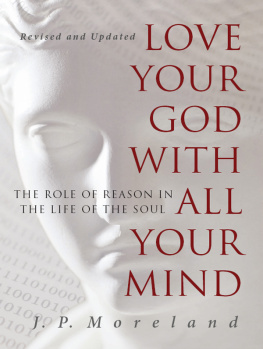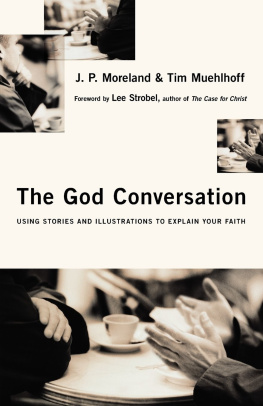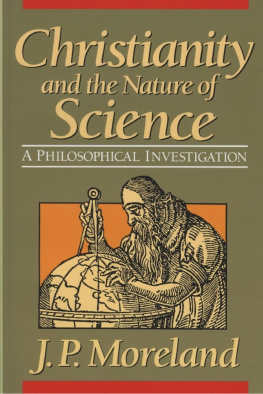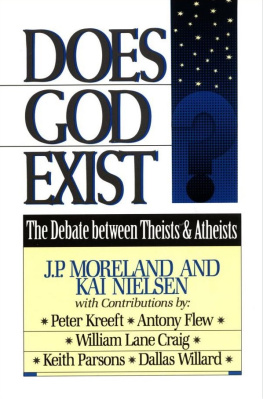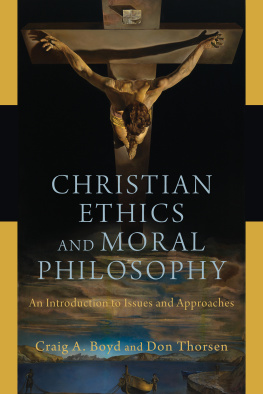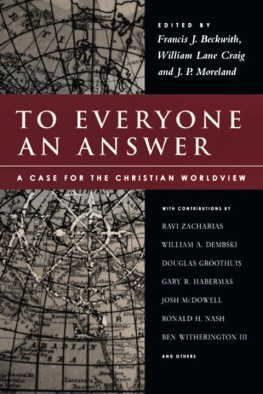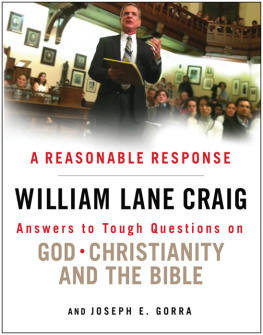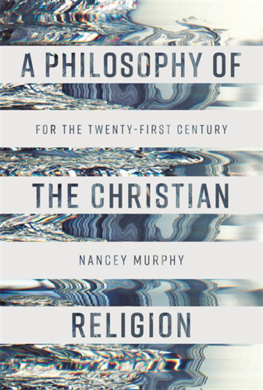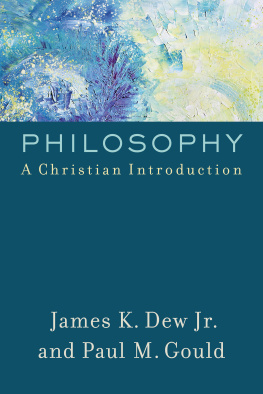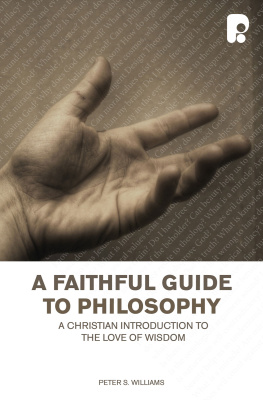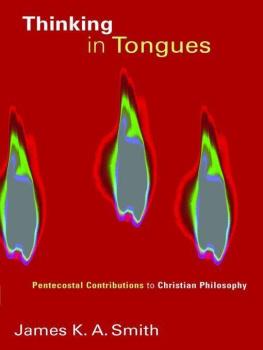Table of Contents
InterVarsity Press
P.O. Box 1400, Downers Grove, IL 60515-1426
World Wide Web: www.ivpress.com
E-mail: email@ivpress.com
2003 by J. P. Moreland and William Lane Craig
All rights reserved. No part of this book may be reproduced in any form without written permission from InterVarsity Press.
InterVarsity Pressis the book-publishing division of InterVarsity Christian Fellowship/USA, a student movement active on campus at hundreds of universities, colleges and schools of nursing in the United States of America, and a member movement of the International Fellowship of Evangelical Students. For information about local and regional activities, write Public Relations Dept., InterVarsity Christian Fellowship/USA, 6400 Schroeder Rd., P.O. Box 7895, Madison, WI 53707-7895, or visit the IVCF website at .
Scripture quotations, unless otherwise noted, are from the New Revised Standard Version of the Bible, copyright 1989 by the Division of Christian Education of the National Council of the Churches of Christ in the USA. Used by permission. All rights reserved.
Cover image: Mel Curtis/Photonica
ISBN-10: 978-0-830-87649-5 ISBN-13: 978-0-8308-2694-0
Printed in the United States of America
Library of Congress Cataloging-in-Publication Data
Moreland, James Porter, 1948-
Philosophical foundations for a Christian worldview / J.P. Moreland
and William Lane Craig.
p. cm.
Includes bibliographical references and indexes.
ISBN 978-0-830-87649-5 (cloth: alk. paper)
1. ChristianityPhilosophy. I. Craig, William Lane. II. Title
BR100 .M68 2003
261.51dc21
To Dallas Willard and Stuart Hackett
Remember those who led you,
who spoke the word of God to you;
and considering the result of their conduct,
imitate their faith. (Hebrews 13:7 NASB)
AN INVITATION TO CHRISTIAN PHILOSOPHY
1 WHY PHILOSOPHY MATTERS
On a clear autumn day in 1980, twenty-five miles west of Chicago in Wheaton, Illinois, Charles Malik, a distinguished academic and statesman, rose to the podium to deliver the inaugural address at the dedication of the new Billy Graham Center on the campus of Wheaton College. His announced topic was The Two Tasks of Evangelism. What he said must have shocked his audience.
We face two tasks in our evangelism, he told them, saving the soul and saving the mindthat is, converting people not only spiritually but intellectually as welland the church, he warned, is lagging dangerously behind with respect to this second task. We should do well to ponder Maliks words:
I must be frank with you: the greatest danger confronting American evangelical Christianity is the danger of anti-intellectualism. The mind in its greatest and deepest reaches is not cared for enough. But intellectual nurture cannot take place apart from profound immersion for a period of years in the history of thought and the spirit. People who are in a hurry to get out of the university and start earning money or serving the church or preaching the gospel have no idea of the infinite value of spending years of leisure conversing with the greatest minds and souls of the past, ripening and sharpening and enlarging their powers of thinking. The result is that the arena of creative thinking is vacated and abdicated to the enemy. Who among evangelicals can stand up to the great secular scholars on their own terms of scholarship? Who among evangelical scholars is quoted as a normative source by the greatest secular authorities on history or philosophy or psychology or sociology or politics? Does the evangelical mode of thinking have the slightest chance of becoming the dominant mode in the great universities of Europe and America that stamp our entire civilization with their spirit and ideas? For the sake of greater effectiveness in witnessing to Jesus Christ, as well as for their own sakes, evangelicals cannot afford to keep on living on the periphery of responsible intellectual existence.
These words hit like a hammer. The average Christian does not realize that there is an intellectual struggle going on in the universities and scholarly journals and professional societies. Enlightenment naturalism and postmodern antirealism are arrayed in an unholy alliance against a broadly theistic and specifically Christian worldview.
Christians cannot afford to be indifferent to the outcome of this struggle. For the single most important institution shaping Western culture is the university. It is at the university that our future political leaders, our journalists, our teachers, our business executives, our lawyers, our artists, will be trained. It is at the university that they will formulate or, more likely, simply absorb the world view that will shape their lives. And since these are the opinion-makers and leaders who shape our culture, the worldview that they imbibe at the university will be the one that shapes our culture. If the Christian worldview can be restored to a place of prominence and respect at the university, it will have a leavening effect throughout society. If we change the university, we change our culture through those who shape culture.
Why is this important? Simply because the gospel is never heard in isolation. It is always heard against the background of the cultural milieu in which one lives. A person raised in a cultural milieu in which Christianity is still seen as an intellectually viable option will display an openness to the gospel that a person who is secularized will not. One may as well tell a secular person to believe in fairies or leprechauns as in Jesus Christ! Or, to give a more realistic illustration, it is like our being approached on the street by a devotee of the Hare Krishna movement, who invites us to believe in Krishna. Such an invitation strikes us as bizarre, freakish, perhaps even amusing. But to a person on the streets of Bombay, such an invitation would, one expects, appear quite reasonable and be serious cause for reflection. Do evangelicals appear any less weird to persons on the streets of Bonn, London or New York than do the devotees of Krishna?
One of the awesome tasks of Christian philosophers is to help turn the contemporary intellectual tide in such a way as to foster a sociocultural milieu in which Christian faith can be regarded as an intellectually credible option for thinking men and women. As the great Princeton theologian J. Gresham Machen explained,
God usually exerts [his regenerative] power in connection with certain prior conditions of the human mind, and it should be ours to create, so far as we can, with the help of God, those favourable conditions for the reception of the gospel. False ideas are the greatest obstacles to the reception of the gospel. We may preach with all the fervour of a reformer and yet succeed only in winning a straggler here and there, if we permit the whole collective thought of the nation or of the world to be controlled by ideas which, by the resistless force of logic, prevent Christianity from being regarded as anything more than a harmless delusion.
Since philosophy is foundational to every discipline of the university, philosophy is the most strategic discipline to be influenced for Christ. Malik himself realized and emphasized this:


